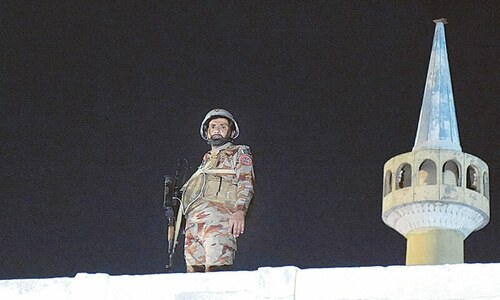I once heard a journalist colleague say that good obituaries are written in advance. I would listen to his banter with our other colleagues about what a good obituary writer he is and, at some point, I began to believe him, that some obituaries are best written while the subject is still living.
It was actually an article by Sajid Hussain, whose death was confirmed by Swedish police on May 1, that changed my perception. Seven years after his friend Hakeem Baloch had passed away, Sajid had written his obituary in 2016 where, among other things, he recalled Hakeem’s laughter. Sajid had written the obituary in such a way that he made his reader laugh and be sad at the same time. The obituary was titled: “About musical intervals and unprovoked laughter.”
I had read the obituary in 2016 but, despite searching for it for hours on social media and through Google, it is now nowhere to be found. Sajid’s writing was so powerful and overwhelming that even a casual reader like me would have his words burnt into one’s mind for a long time to come. In a curious way, it was a treat to read Sajid’s pieces, though their subject matter was often sombre.
Born on January 16, 1981 in the town of Mand in Balochistan’s Kech district, Sajid Hussain belonged to a political and educated family that had settled in Karachi. Spending most of his early years in Karachi, Sajid graduated in economics from the University of Karachi. During his university years, Sajid remained active in student politics. But later, when he took up a career as a journalist in Karachi, his political activity waned. Among his friends he was known to be a polite gentleman and an avid reader with an extraordinary interest in literature.
Although I never met him personally, I was introduced to him through his writings in The News, where he de facto headed a team of over 50 reporters, subeditors, and other non-editorial staff. Previously, he had also worked as an assistant editor at The Daily Times.
Sajid Hussain Baloch, who went missing in Sweden on March 2 and whose body was found by Swedish police on April 23, was a remarkably selfless man and fearless journalist who continued to give a voice to the Baloch even in self-exile abroad
Apart from being an assistant editor, he wrote stories about his home province, Balochistan. The first time I came across his writing was an article titled “The Other Jihad” printed in The News, in which he brought to light Baloch jihadis who were fighting against Iran.
Although Sajid resigned from The News to join a non-governmental organisation in Quetta, he continued to write while keeping a low profile. Besides contributing to The News, he also worked for Reuters. Among other topics, he wrote on the issue of missing persons and the notorious drug traffickers of Balochistan and, as a result of his fearless and bold writing, he landed in trouble. Feeling his life and safety were under threat, he left Pakistan on September 25, 2012, leaving behind his wife and two young children.
Since 2012, Sajid lived for various times in self-exile in Oman, Uganda and the United Arab Emirates, before moving to Sweden in 2017. During these years, he once posted the following on his Facebook wall: “After one-and-a-half years of complete solitude, I can now accurately count the number of flies and lizards in my bedroom.”
While in Uganda, although he worked as a supervisor of trailer trucks, he founded an online magazine Balochistan Times in 2015. In the backdrop of a bomb blast in Quetta, he penned his memories of making headlines for tragedies in Pakistan. He wrote: “Quetta bleeds again. Death toll rises to 70. I saw such headlines in Pakistani newspapers today on my phone while checking the tyres of the trucks to be sure they had not been replaced with old ones by the ‘dishonest’ drivers.”
Eventually moving to Sweden in 2017, Sajid filed an application for asylum, which was granted in 2019. He went missing on March 2 this year, and his body was found on April 23 by Swedish police from River Fryis outside Uppsala. Initial investigations have not suggested a motive behind the death of Sajid Hussain, but several journalist bodies have expressed their concern about the tragedy.
In the recent years that I had become friends with him, we exchanged emails, messages, and chatted on Whatsapp, sometimes on video calls. Sometimes, he would not reply for days but would finally respond. “Sorry! Sometimes my mind stops working,” he once apologised for not replying promptly.
In Balochistan, it is believed that only those who do not find a good job end up becoming journalists. Despite this perception fixed in people’s minds, and journalism being a thankless profession, Sajid extensively wrote about the Baloch people in a language only some of them understand.
Sajid would sometimes ask me about his journalist friends in Karachi. When I bumped into Imtiaz Ali, a reporter at Dawn who had worked with Sajid at The News, we spoke about Sajid while we stood in the corridor outside the newsroom at the Dawn office. I delivered Imtiaz’s message to Sajid, telling him that Imtiaz was calling him “bewafa” (disloyal) for leaving us all behind in Karachi.
Sajid, who used to call Imtiaz “Saeen” (a salutation of respect in Sindhi), laughed a lot and replied with the following: “I cannot stop smiling thinking about Imtiaz. He is one of the nicest people I know and very resourceful as a political reporter.”
As a journalist, Sajid Hussain remained undeterred, and continued to write about the challenges that his ill-fated province, Balochistan, confronted. It is a coincidence that I am writing about Sajid Hussain on May 3, World Press Freedom Day, and it is agonising to write an obituary of a journalist’s death which took place in Sweden, a country considered one of the safest places for journalists. It seems as though no place in the world is safe for them and they can die mysteriously anywhere in the world.
Sajid Hussain often viewed his own exile from his journalistic lens. “He was a kid when I left,” he told me when I asked about his brother, now also a journalist in Karachi. Another time, when Sajid’s cousin had shared a photograph of Sajid’s own young son, Sajid had asked on his Facebook wall about who the cute baby was. This was Sajid’s unique way of telling his own story of exile, which set him apart from others. Reportedly, he was also working on the manuscripts of two novels — certainly his facility with words and expression would have allowed him to powerfully put across in fiction what he sometimes could not say in journalism.
In Balochistan, it is believed that only those who do not find a good job end up becoming journalists. Despite this perception fixed in people’s minds, and journalism being a thankless profession, Sajid extensively wrote about the Baloch people in a language only some of them understand. His writings, targeted at the educated class and the policymakers of the country, vehemently spoke out for the Baloch people, highlighting the injustices meted out to them in order to attract the attention of the authorities towards his province and his people. He continued to work for the betterment of his people throughout his life, irrespective of the challenges he was going through in his own life, including having to leave his motherland and his family to survive.
The problem with journalists such as Sajid Hussain is that they live their lives for others. They may not write their own obituaries but they bear witness to their obituaries throughout their lives. Nor do they ever let anyone know their own suffering. They leave this world silently after suffering in their lives for others. But the question that bothers me is that when people such as Sajid Hussain pass on, why do they let their families and loved ones suffer so much because of their arduous journey?
I still do not know whether an obituary should be written before or after someone dies. But what I do know for sure is that, either way, it can still bring tears to your eyes when you are writing one.
The writer is a member of staff. He tweets @akbar_notezai
Published in Dawn, EOS, May 10th, 2020















































